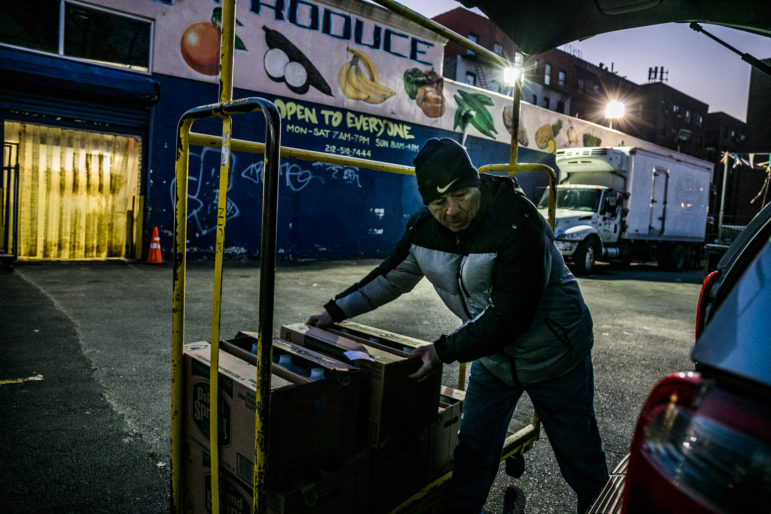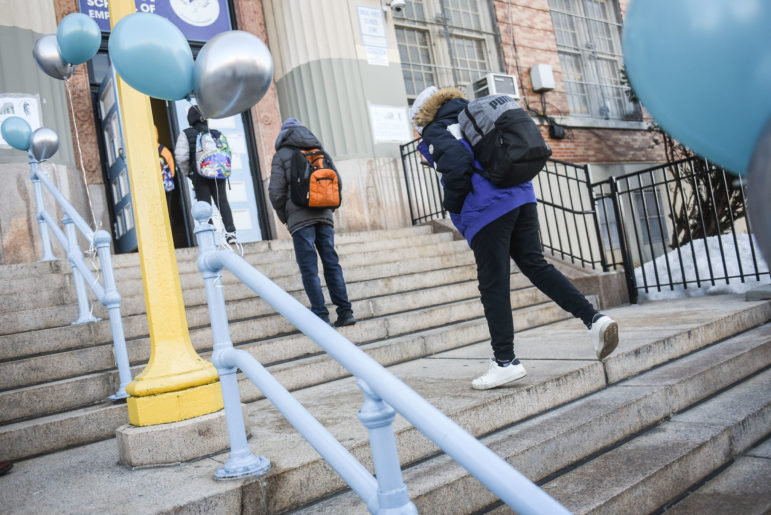
Adi Talwar
Amigo Produce on the corner of 206th Street and 9th Avenue, among the commercial areas that would be affected by the proposed rezoning.
For a little more than six hours, dozens of Inwood residents, community organizers, city officials and developers gave opposing and supporting testimonies Wednesday at the Department of City Planning’s hearing on the disputed Inwood rezoning plan.
Proponents of the plan from city agencies to developers were met with boos and snickers from the opposing crowd while the opposition comprised of Inwood residents, businesses and community organizations were cheered during the hearing. Community members were creative in driving their message home from holding signs that said “Vote No,” “Not For Sale,” “Not True,’ to offering baked goods: Community member Chris Nickell distributed chocolate banana bread he made from the “rotten bananas” in the Economic Development Corporation’s version of the Inwood plan.
The Inwood rezoning, the fifth neighborhood rezoning sponsored by the de Blasio administration, is in the middle of a seven-month public review procedure to approve, amend or reject the mayor’s rezoning proposal. In advisory opinions delivered last month, both Community Board 12 and Borough President Gale Brewer have said no to the current plan while calling for certain changes.
The City Planning Commission hearing will be followed by a vote. The City Council is next, where Councilmember Ydanis Rodriguez—the catalyst behind the rezoning study—will have a strong say in the final, binding decision.
Cecilia Kushner, the Senior Vice President for Development at the Economic Development Corporation (EDC), began the hearing with an introduction to the Inwood plan, which she said reflected public input and was designed to anticipate changes in the economy.
“Through the application, a lot of what we heard is, it was important to make Inwood a mixed-use community,” she said. “A lot of the changes we made in the zoning proposal reflect that reality and open the door for that possibility. That balance between the uses is one of great debate in the neighborhood over what is appropriate. … So we understand there is a debate and conversation about this but what we have tried to do is strike the right balance for the long term knowing that the zoning will be there for several decades and for more jobs to come to Inwood.”
The EDC’s proposed Inwood rezoning measure would allow new residential and commercial development on and east of 10th Avenue, as well as on Dyckman Street, West 207th Street and Broadway (also known as the Commercial ‘U’), while applying contextual zoning—protections to preserve neighborhood character—for several residential areas west of 10th Avenue. In all upzoned areas, the city’s mandatory inclusionary housing policy would apply, requiring that 20 to 30 percent of housing be income-targeted. The land-use application also includes other actions such as the redevelopment of the Inwood library with income-targeted housing, a new library and a pre-K facility, and regulations to improve waterfront access.
The city has also put forth the Inwood NYC Action Plan, which promises a list of investments in subsidized housing, anti-displacement strategies, neighborhood infrastructure, local businesses and workforce development.
In response to what they see as flaws in both plans, a coalition of Inwood community groups—including Northern Manhattan Is Not For Sale, Inwood Preservation, Inwood Small Business Coalition and Save Inwood Library—and residents proposed their own plans, the Uptown United Platform, in February. The community proposal focused on more affordable housing, protecting small business, anti-gentrification efforts, and traffic congestion; it also proposed a separate land-use review process for the library.
At the hearing, most opponents of the city’s rezoning proposal expressed concerns about existing and future affordable housing, small businesses, relocating the Inwood library, traffic congestion, gentrification, preservation, culture, and changes in the quality of life. Some Planning Commission members expressed similar concerns during their questioning of city officials from EDC, the Department of Small Business Services and the Department of Housing Preservation and Development.
“The real challenge here is to avoid doing harm to the existing levels of affordability in community that really depends on affordable housing,” said CPC Commissioner Anna Hayes Levin. “We have an extremely large—uncharacteristically large—number of rent-protected units in that neighborhood. And a large number of those units are now preferential rent, so they are really at risk to rise.” Preferential rents are rents on stabilized units that are lower than the legal maximum: Under current, landlords can raise those rents dramatically.
The library was a focus early on. The public testimony began with teacher and resident Nancy Rakoczy, who said local schools did not have their own libraries and depended on the Inwood library as a valuable resource. Rakoczy did not trust the city to provide a functional interim library: “I am suspicious of anything that is interim. I really am. I would see it as smaller and inadequate and not doing justice to the needs of the community. I see it as a cynical attitude towards lower-income children. I think if this was the suburbs, there would be a shiny new plan in place.”
Kushner said the library project would include 176 deeply affordable housing units, and that another large property owner on the waterfront has committed to 100 percent affordable housing in collaboration with the Department of Housing and Preservation.
CPC commissioners Larisa Ortiz and Cheryl Cohen Effron each expressed concern about small businesses and academic space for the growing population.
But the public comments quickly turned to deeper issues.
“We are supposed to really believe that what happened in Williamsburg and Long Island City is not going to happen in Inwood. Because this is now and that was then and that was Bloomberg and this is de Blasio,” said Lena Melendez, a member of Riverside Edgecombe Neighborhood Association and Dominicans in Defense of Businesses and Housing. “But one thing is for sure: If the majority … of the apartments built are market rate—$2,700 dollars a month—and have the effect of pricing out Blacks and Latinos it will have a racially segregatory affect. We are talking economic apartheid.”
Brewer said the fears of immigrant and low-income communities like Inwood were based in the realities of gentrification. “If we are going to encourage significant new development we have an obligation to ensure our plans go a long way towards solving the problems in the short and long term,” she said.
Brewer listed her major concerns as affordable housing, protecting current tenants, preserving historical sites and cultural spaces, making room for schools and protecting small business. “The city does not have a retail plan. Period. End of discussion,” she added.
Brewer’s testimony was met with an applause and cheers from the public. Inwood business owners and employees also gave their testimony about concerns they have about relocating during the rezoning process if and when the plan is approved.
According to the Department of City Planning an estimated 90 people, split almost evenly between supporting and opposing groups, gave their testimonies at the hearing. The vote from the City Planning Commission must take place within 60 days.









One thought on “Opinion Split at City Planning Commission Hearing on Proposed Inwood Rezoning”
This is an excellent and detailed report. However, I feel comment on one aspect of the day’s events is in order. While the number of testifiers at this hearing was, as reported, roughly evenly split between those for and those against the rezoning, it should be noted that those in favor were virtually all members of city or or other government agencies, landowners, developers, large business owners and others who do not live in Inwood and likely stand to profit from the effects of the rezoning. No neighborhood residents or small business owners spoke in favor of the rezoning. This is also the first hearing at which there has been any substantial amount of public testimony in favor of this rezoning. I and others in the Inwood community have reason to believe that this is likely in response to recent pressure put on those who stand to profit from the rezoning to support it more publicly by Councilmember Rodríguez in response to the fact that opposition has been virtually unanimous by the community over hundreds of hours of meetings, hearings and individual testimonies up to this point.
It should also be further noted that a large number of testifiers who had signed up to speak in favor of the rezoning had left by the time their names had been called, while only a very few of those opposed had similarly left. I feel this further supports the hypothesis that many pro-rezoning testifiers appeared in response to having been asked to do so, rather that out of their own concern for what is at stake.
The author of this comment is an Inwood resident and member of Northern Manhattan is Not for Sale, Save Inwood Library and other groups supporting the Uptown United Platform, and was present for the entirety of the City Planning Commission’s hearing on the proposed Inwood Rezoning.